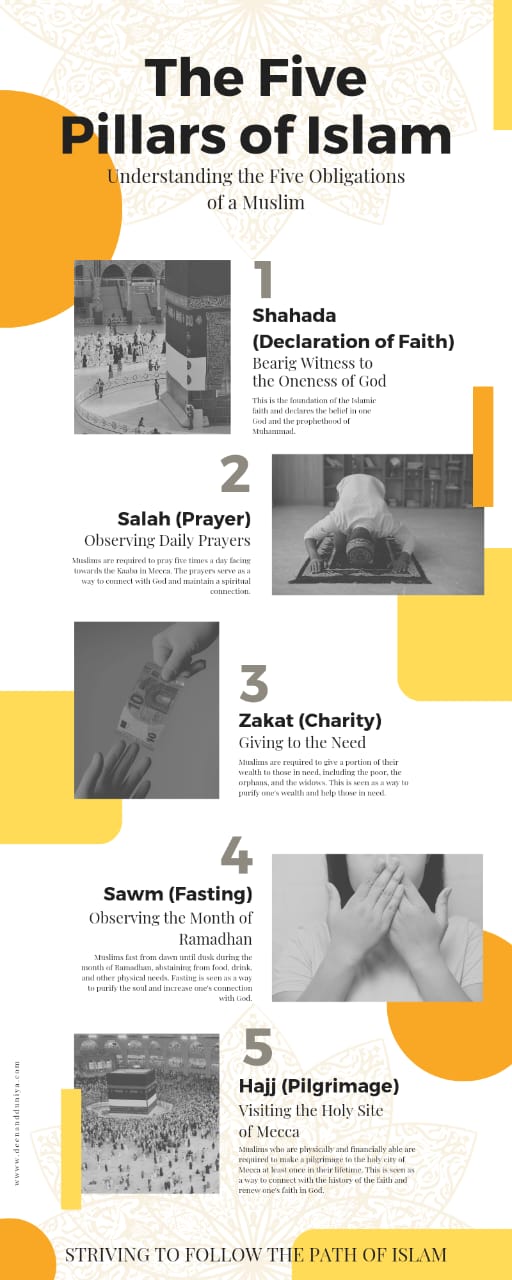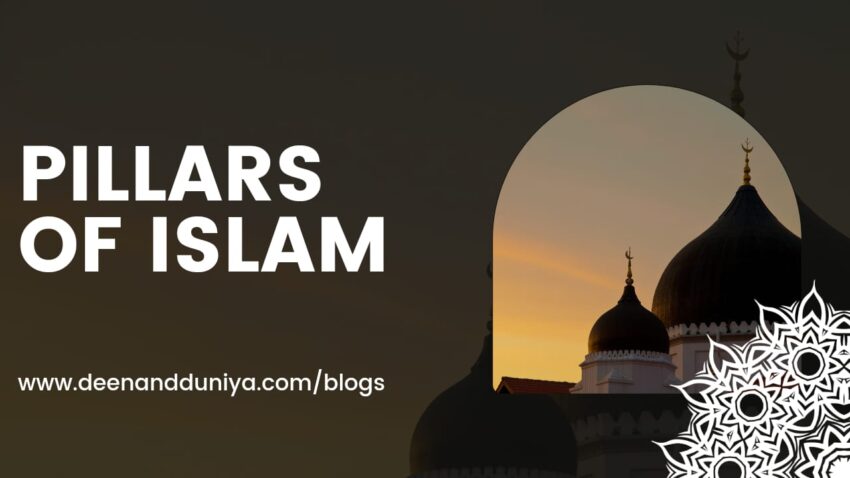PILLARS OF ISLAM AND THEIR SIGNIFICANCE
Islam is one of the world’s largest and fastest-growing religions, with billion followers worldwide. It is based on the teachings of the Prophet Muhammad, who lived in Arabia in the 7th century CE. The fundamental beliefs of Islam are expressed through the Five Pillars of Islam, which serve as the foundation of Islamic practice and are considered essential for the spiritual growth and salvation of a Muslim.
The five pillars of Islam are the basic acts of worship and obedience that every Muslim must adhere to. These pillars are the foundation of the Islamic faith, and they serve as a guide for Muslims to lead a pious and righteous life. In this response, I will explain each pillar and provide examples of how they relate to modern life, along with a relevant Hadith and Quranic verse for each.
- Shahada – Declaration of Faith
The first pillar of Islam is Shahada, which is the declaration of faith. It is the testimony that there is no god but Allah, and that Muhammad is his messenger. This declaration is the foundation of Islam, and it serves as a way for Muslims to show their belief in the oneness of God.
In modern life, this pillar is a reminder of the importance of staying true to one’s beliefs and values, even in the face of adversity. It also serves as a way to build a strong sense of community among Muslims, as they all share this common belief.
A relevant Hadith for this pillar is: “Whoever testifies that there is no god but Allah, alone without partner, and that Muhammad is His servant and His Messenger, and that Isa (Jesus) is the servant of Allah and His Messenger, and His Word which He bestowed on Maryam (Mary) and a spirit created by Him, and that Paradise is true, and Hell is true, Allah will admit him into Paradise, whatever his deeds may be.” (Bukhari)
A relevant Quranic verse for this pillar is: “There is no god but He: That is the witness of Allah, His angels, and those endowed with knowledge, standing firm on justice. There is no god but He, the Exalted in Power, the Wise.” (3:18)
- Salah – Prayer
The second pillar of Islam is Salah, which is the mandatory five daily prayers. Muslims are required to pray at specific times throughout the day, facing towards the Kaaba in Mecca. This act of worship serves as a way for Muslims to connect with God and to seek His forgiveness and guidance.
In modern life, this pillar is a reminder of the importance of maintaining a consistent connection with God, even in the midst of a busy and chaotic lifestyle. It also serves as a way to cultivate discipline and mindfulness, as Muslims are required to pause from their daily routine and focus on their prayers.
A relevant Hadith for this pillar is: “The first act that the servant of Allah will be accountable for on the Day of Judgment will be Salah. If it is good, then the rest of his acts will be good. And if it is bad, then the rest of his acts will be bad.” (Tirmidhi)
A relevant Quranic verse for this pillar is: “Successful indeed are the believers, who are humble in their prayers.” (23:1-2)

- Zakat – Charity
The third pillar of Islam is Zakat, which is the giving of charity. Muslims are required to give a portion of their wealth to those in need, as a means of purifying their wealth and helping others. This act of charity serves as a way for Muslims to show compassion and empathy towards their fellow human beings.
In modern life, this pillar is a reminder of the importance of giving back to the community and helping those in need. It also serves as a way to address issues of poverty and inequality, as Muslims are encouraged to give generously to those less fortunate.
A relevant Hadith for this pillar is: “Charity does not decrease wealth.” (Muslim)
Zakat is one of the five pillars of Islam, which is an obligatory act of worship for all able Muslims who meet the specified criteria. This charitable giving is regarded as a means of purifying one’s wealth and achieving social justice, and it is an essential aspect of the Islamic faith. The importance of Zakat can be seen in the Hadith and Quranic quotes which emphasize its significance.
In the Hadith, Prophet Muhammad (PBUH) said, “Whoever gives Zakat to purify his wealth, Allah will bless his remaining wealth, and whoever performs Hajj for the sake of Allah, and does not commit any obscenity or wrongdoing, he will return (free from sin) as the day his mother gave birth to him” (Bukhari). This Hadith highlights the importance of Zakat in purifying one’s wealth and Hajj in purifying one’s soul.
Furthermore, the Quran emphasizes the importance of Zakat in several verses. For instance, Allah says in Surah Al-Baqarah, “And establish prayer and give Zakat, and whatever good you put forward for yourselves – you will find it with Allah. Indeed, Allah of what you do, is Seeing” (2:110). This verse highlights that Zakat is a form of worship that is essential to achieving the pleasure of Allah and gaining His reward.
4.Fasting- Ramdaan -The Holy Month
Fasting is another important pillar of Islam, and it is an act of worship that is performed during the holy month of Ramadan. Fasting is a means of developing self-discipline, increasing taqwa (God consciousness), and strengthening one’s faith.
Allah says in Surah Al-Baqarah, “O you who have believed, decreed upon you is fasting as it was decreed upon those before you that you may become righteous” (2:183). This verse highlights that fasting is an act of worship that is prescribed to all believers, and it is an essential means of achieving righteousness and closeness to Allah.
5.Hajj-Pilgrimage
Moving on to the importance of Hajj, it is the fifth pillar of Islam, and every able Muslim is required to perform it at least once in their lifetime. Hajj is an act of worship that involves traveling to the holy city of Mecca in Saudi Arabia, where Muslims perform a series of rituals that commemorate the Prophet Ibrahim’s (AS) devotion to Allah.
Prophet Muhammad (PBUH) said, “Whoever performs Hajj for Allah’s pleasure and avoids all lewdness and sins, he returns like (the day) his mother bore him” (Bukhari). This Hadith highlights the significance of Hajj in purifying one’s soul and achieving a fresh start in life.
Moreover, the Quran also emphasizes the importance of Hajj in several verses. Allah says in Surah Al-Hajj, “And proclaim to the people the Hajj [pilgrimage]; they will come to you on foot and on every lean camel; they will come from every distant pass” (22:27). This verse highlights that Hajj is an act of worship that is proclaimed to all people, and it is an obligation that is universally recognized by Muslims worldwide.
In conclusion, understanding the pillars of Islam is crucial for Muslims to live a fulfilling and righteous life. The five pillars of Islam – Shahada, Salah, Zakat, Sawm, and Hajj – are the foundation of Islam and provide a framework for Muslims to connect with their faith and maintain a relationship with Allah.
The first pillar, Shahada, highlights the importance of belief in one God and the prophethood of Muhammad (peace be upon him). This pillar reminds Muslims of the core of their faith and the importance of having faith in Allah. A hadith by Prophet Muhammad (peace be upon him) states, “Whoever says, ‘There is no god but Allah alone, without any partner, His is the kingdom and His is the praise and He has power over all things,’ one hundred times a day, it will be a guarantee for him to not enter Hellfire.” (Muslim)
The second pillar, Salah, emphasizes the importance of prayer and connecting with Allah five times a day. Salah is a means of seeking forgiveness, expressing gratitude, and gaining spiritual strength. As mentioned in the Quran, “Successful indeed are the believers, those who humble themselves in their prayers” (Quran 23:1-2). The practice of Salah helps Muslims develop a disciplined and focused approach to their daily lives.
The third pillar, Zakat, highlights the importance of giving to those in need and helping to alleviate poverty. This pillar emphasizes the importance of social responsibility and caring for the less fortunate. The Quran says, “Take, [O, Muhammad], from their wealth a charity by which you purify them and cause them increase, and invoke [ Allah’s blessings] upon them. Indeed, your invocations are reassurance for them. And Allah is Hearing and Knowing” (Quran 9:103). By fulfilling this pillar, Muslims can develop a sense of empathy and compassion towards others.
The fourth pillar, Sawm, involves fasting during the month of Ramadan. This pillar teaches Muslims the importance of self-discipline and self-control. Fasting helps to purify the soul and increase one’s spiritual strength. The Quran states, “O you who have believed, decreed upon you is fasting as it was decreed upon those before you that you may become righteous” (Quran 2:183). Fasting also provides an opportunity for Muslims to reflect on their lives and focus on their spiritual growth.
The fifth and final pillar, Hajj, involves the pilgrimage to the holy city of Mecca. This pillar highlights the importance of unity and brotherhood among Muslims. Hajj is a time for Muslims from all over the world to come together and fulfill their obligation to Allah. The Quran says, “And pilgrimage to the House is a duty upon mankind for the sake of Allah, [for] whoever is able to find a way there” (Quran 3:97). Hajj also reminds Muslims of the sacrifices made by Prophet Ibrahim (peace be upon him) and his family and encourages Muslims to follow in their footsteps.
Overall, the pillars of Islam are not only relevant to the historical context in which they were established but also provide practical guidance for Muslims in modern times. By following these pillars, Muslims can lead a meaningful and fulfilling life, grounded in their faith and relationship with Allah.
-ALI RAZA



